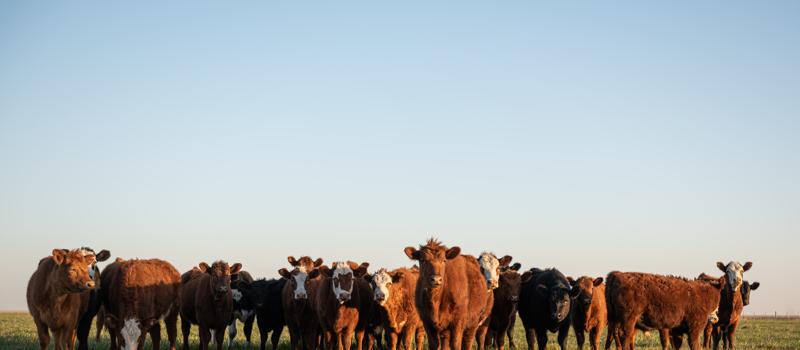Mosquitoes and Their Impact on Livestock Health
Posted by Mosquito Squad
July 11, 2023

Mosquitoes are known vectors of human and animal diseases. Mosquito-borne illnesses can majorly impact animal health for livestock like cattle, sheep, pigs, and even horses. The four most prominent arboviruses affecting livestock are West Nile Virus, Equine Encephalitis, Japanese Encephalitis, and Rift Valley Fever. Prevention is the best way to protect your animals from mosquito diseases. If you suspect your animals have any of the following conditions, contact your veterinarian and local agriculture health departments as soon as possible.
West Nile Virus (WNV)
Disease Agent: Virus (Flavivirus)
Vector: Culex species mosquitoes
Range: Africa, Europe, the Middle East, North America, and West Asia
West Nile Virus is found throughout the United States and can be contracted by sheep, cattle, pigs, and horses. When an infected mosquito feeds on a barnyard animal, WNV spreads through the mosquito's saliva. Infected animals are often asymptomatic and experience few complications, as is the case with sheep, cattle, and pigs. Additionally, WNV does not multiply to high enough levels in livestock to be transmissible; large animals are considered "dead-end hosts" as they cannot spread the disease after infection.
Though WNV poses little danger to most livestock, horses can suffer more serious symptoms upon contracting the arbovirus. Symptoms are typically neurological, and infected horses may not immediately show signs of illness. Encephalitis (brain inflammation) is among the more severe neurological complications and can be fatal. There is no specific treatment for horses, so WNV vaccine prevention and supportive care after infection are the best methods for helping horses recover.
Equine Encephalitis (EE)
Disease Agent: Virus (Alphavirus, similar to Chikungunya)
Vector: Culiseta species for birds, Aedes, Coquillettidia, and Culex for mammals
Range: North America and the Caribbean
Equine Encephalitis, sometimes called “sleeping sickness," is a disease that causes inflammation and damage to the brain, spinal cord, and central nervous system in horses, causing their physical and mental functions to slow dramatically. Equine encephalitis comes in three alphaviruses: Eastern, Western, and Venezuelan. While horses and other equines (donkeys, mules, zebras, etc.) are most affected, other animals (mammals, reptiles, and birds) can also contract EE.
Symptoms of EE manifest both physically and behaviorally. Infected animals may exhibit physical symptoms, such as fever, impaired vision, and muscle spasms, or behavioral symptoms, such as depression, head-pressing and circling, or extreme fatigue. Horses infected with EE have a very high mortality rate and often do not survive past the first few days after showing symptoms. Preventing mosquitoes from breeding and biting is crucial to protecting livestock from EE.
Japanese Encephalitis (JE)
Disease Agent: Virus (Flavivirus, similar to WNV)
Vector: Culex species
Range: Asia and Oceania, from Japan to India, Pakistan, and Australia
Japanese Encephalitis is a zoonotic arbovirus that primarily affects pigs, though horses, cattle, domestic pets, and wild animals can also contract and transmit the disease. Waterbirds such as herons and egrets serve as "reservoir hosts" that allow the infection to spread; these animals harbor disease and amplify a pathogen but do not die from disease contraction.
Symptoms of JE appear 8-10 days after infection and can include fever, fatigue, and neurological signs similar to Equine Encephalitis. JE infection can lead to fertility issues in pigs and stillborn or weak piglets. Male pigs (boars) may also exhibit orchitis and reduced libido, while female pigs (sows) exhibit little to no physical symptoms. There is no treatment for JE contraction across animal species, and mosquito control is essential to protecting animals in at-risk areas.
Rift Valley Fever (RVF)
Disease Agent: Virus (Phlebovirus)
Vector: Aedes and Culex species
Range: Eastern and Southern Africa, sub-Saharan Africa, Madagascar, Saudi Arabia, and Yemen
Rift Valley Fever is an emerging zoonotic arbovirus in domestic livestock throughout Africa. Though the disease spreads commonly through livestock, humans can contract RVF through contact with body fluids and tissue from infected animals in addition to the bites of infected mosquitoes. The most vulnerable animals include herd animals, and symptoms range from fever and weakness to severe illness and death (higher fatality in younger animals). RVF also impacts the viability of pregnancies in infected herd animals, leading to miscarriage in nearly 100% of livestock pregnancies.
Though this disease is not found in the United States, it is important to understand the major effects of RVF on animal and human health. As climates worldwide continue to change, leading to increased precipitation and irregular warm and cold periods, the range of tropical and neotropical mosquitoes is spreading. As mosquito ranges increase, so does the range of mosquito-borne diseases. In fact, we are currently seeing the beginning of this trend as new malaria cases are being reported locally contracted within the United States.
How Can Mosquito Squad Help?
Any mosquito bite could mean disease transmission for you or your animals. Mosquito Squad’s essential service as a protector of public health drives us to equip you with the information and services necessary to keep your barnyard friends happy and healthy. Our licensed technicians and service pros help remove mosquitoes from your yard and prevent them from returning between services.
Contact your local Mosquito Squad to learn about our treatment options and schedule your service today.
